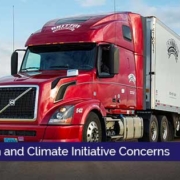Transportation and Climate Initiative Concerns
Originally submitted on April 9, 2021.
TAM is committed to improving air quality in Massachusetts and supporting policies that safeguard the environment. And while we appreciate and applaud the efforts of the Baker administration to pursue these goals via the TCI-P, we have multiple questions and concerns about how the program will affect Mass trucking companies, particularly users of diesel fuel, when officially enacted.
TCI-P will inherently change behavior in the commercial transportation sector, but potentially not as it was intended. Diesel fuel in particular will continue to be utilized in Massachusetts, but it will simply be purchased elsewhere whenever possible. Most troubling is that it will likely not significantly reduce emissions already being reduced from increasingly stricter diesel fuel regulations, and will actually drive businesses and jobs away from our state.
We understand that TCI-P is designed to reduce the amount of fossil fuel utilized for transportation in Massachusetts. But it is problematic that the commercial transportation sector is not considered separately. Diesel fuel and gasoline fees (taxes) should not be looked at equally; they are very different.
Unfortunately, in our opinion, the limited amount of participation across the region is problematic on many fronts as well, and seems to call into question the viability of the initiative at this point. Listed below is a sampling of some of the concerns we have with TCI-P, and we would welcome the opportunity to discuss these issues to obtain clarity and understand how these concerns are being addressed.
- It is concerning to us that 9 of the 13 original potential participants in the program have declined to sign the Memorandum of Understanding, including Vice Chairman Larry Hogan (MD). Is there enough bandwidth with the remaining participants to create change?
- The administrative bureaucracy that the TCI-P would create could make decisions that will raise the price of gas — and it appears that those decisions could be made by officials that have not been elected by the people of Massachusetts.
- While the charge is not being framed as a ‘tax’ because of the point of regulation, we believe in practice the increase in gas and diesel fuel prices will be perceived negatively by residents of MA and will actually be considered a “tax” — along with current fuel taxes, excise and federal taxes that already exist.
- IFTA diesel fuel excise taxes appear not to have been considered within TCI-P. IFTA fuel taxes are equitably paid to the state in which the fuel is consumed. The TCI-P fee will not be equitable and only charged on sales in Massachusetts. Out of state trucks, who will now be encouraged to obtain fuel outside of Massachusetts, will not contribute to the TCI-P model whatsoever.
- Funds raised by this increase do not seem to take into consideration the needs of our current infrastructure. Given, in our opinion, that the increase will be perceived as a “tax” by the general public, the ability to increase fuel costs additionally at any time will/would be difficult and therefore roads and bridges will continue to deteriorate.
- Since the program will not impact emissions in states outside of the agreement that do not have strong clean-energy policies, this could degrade Massachusetts air quality by blowing those dirty emissions into our state impacting the desired effect.
- The trucking industry already has a long history of reducing carbon emissions, and that work continues. In addition, global automakers are pledging to go all electric within the next 10-15 years — suggesting that dirty emissions will decline significantly irrespective of the TCI-P agreement. In fact, TCI-P itself asserts that emissions during a ten-year period in the region will fall 19%, even without the initiative being enacted, because of federal emissions standards.
- We are concerned that the funding for the initiative will not be sustainable. As we move to an increased number of electric vehicles, there will be less and less revenue generated for TCI-P funded projects.
- Because of the projected increase in fuel cost, the program puts Massachusetts trucking companies at a disadvantage if they purchase fuel in our state. Significant fuel cost reduction will be achieved by simply crossing the border into non-participating states to buy fuel, and Massachusetts companies will be forced to do that to stay competitive.
- Given the minimum opening price for a TCI-P credit and the average mileage of a Class 8 truck, we estimate there will be at least a 2 cent per mile cost. This is a significant cost increase and another reason companies will be forced to fuel outside of Massachusetts whenever possible.
- Given the new documentation, record-keeping requirements and potential disruption of audits, the initiative adds a significant amount of work/cost for diesel suppliers that do not currently exist. We are concerned about the new burden this imposes on Massachusetts fuel supplier companies, including the cost for hiring newly created agencies to do necessary auditing. Again, this is an incentive for companies to domicile elsewhere, and for companies that are not able to move their operations, this is a significant cost that will ultimately put many of them out of business.
- Fuel optimization systems, available to trucking companies currently, will route vehicles outside of the state to purchase fuel whenever possible to achieve the lower fuel cost from neighboring states, yet those trucks will still drive and impact Massachusetts roadways.
Trucking Industry’s Emission Reduction Progress
All figures are per US EPA
Year: 2002
Mandate/Technology: Exhaust Gas Recirculation (EGR)
Environmental Benefit: 50% NOx emissions reduction
Cost to Industry: $250 million annually
Year: 2006 – 2010
Mandate/Technology: Ultra Low Sulfur Diesel (ULSD)
Environmental Benefit: 97% reduction of sulfur in diesel
Cost to Industry: $4 billion annually (in combination with PM/NOx limits)
Year: 2007 – 2010
Mandate/Technology: US EPA PM and NOx limits; Diesel Particulate Filters (DPFs)
Environmental Benefit: 90% reduction of Particulate Matter (PM) “soot” 90% reduction of NOx
Cost to Industry: $4 billion annually (in combination with ULSD)
Year: 2014
Mandate/Technology: US EPA/NHTSA “Phase 1” Greenhouse Gas Emissions Standards and Fuel Efficiency Standards for Medium- and Heavy-Duty Engines and Vehicles
Environmental Benefit: 23% reduction of CO2 emissions
Cost to Industry: $8 billion
Year: 2021, 2024, 2027
Mandate/Technology: US EPA/NHTSA “Phase 2” Greenhouse Gas Emissions Standards and Fuel Efficiency Standards for Medium- and Heavy-Duty Engines and Vehicles
Environmental Benefit: additional 34 percent reduction of CO2 emissions
Cost to Industry: $20 – $30 billion
Massachusetts Trucking Industry Data
- 86.9%: number of Massachusetts communities that depend exclusively on trucks to move their goods
- 95%: percent of manufactured tonnage transported by truck in Massachusetts
- $7.3 billion: total trucking industry wages paid in Massachusetts (2019)
- 129,300: trucking industry jobs in Massachusetts (2019)
- $56,154: average annual trucking industry salary in Massachusetts (2018)
As of January 2021, a typical five-axle tractor-semitrailer combination paid:
- $5,760 state highway user fees and taxes
- $8,906 federal highway user fees and taxes
TAM is anxious to get a better understanding of TCI-P’s plans to address these issues as well as many others. We stand at the ready to discuss all issues and to offer our expertise to further detail any and all of the issues we have raised.
Respectfully submitted
Kevin Weeks
Executive Director



